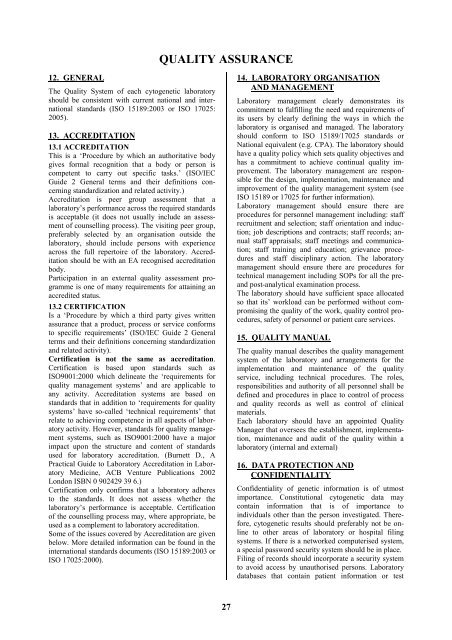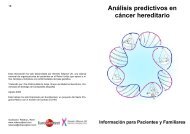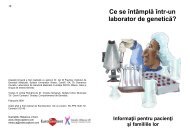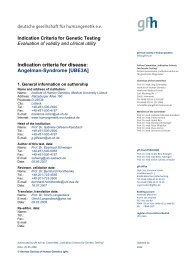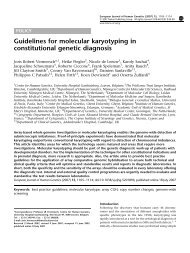Cytogenetic Guidelines and Quality Assurance - EuroGentest
Cytogenetic Guidelines and Quality Assurance - EuroGentest
Cytogenetic Guidelines and Quality Assurance - EuroGentest
You also want an ePaper? Increase the reach of your titles
YUMPU automatically turns print PDFs into web optimized ePapers that Google loves.
12. GENERAL<br />
The <strong>Quality</strong> System of each cytogenetic laboratory<br />
should be consistent with current national <strong>and</strong> international<br />
st<strong>and</strong>ards (ISO 15189:2003 or ISO 17025:<br />
2005).<br />
13. ACCREDITATION<br />
13.1 ACCREDITATION<br />
This is a ‘Procedure by which an authoritative body<br />
gives formal recognition that a body or person is<br />
competent to carry out specific tasks.’ (ISO/IEC<br />
Guide 2 General terms <strong>and</strong> their definitions concerning<br />
st<strong>and</strong>ardization <strong>and</strong> related activity.)<br />
Accreditation is peer group assessment that a<br />
laboratory’s performance across the required st<strong>and</strong>ards<br />
is acceptable (it does not usually include an assessment<br />
of counselling process). The visiting peer group,<br />
preferably selected by an organisation outside the<br />
laboratory, should include persons with experience<br />
across the full repertoire of the laboratory. Accreditation<br />
should be with an EA recognised accreditation<br />
body.<br />
Participation in an external quality assessment programme<br />
is one of many requirements for attaining an<br />
accredited status.<br />
13.2 CERTIFICATION<br />
Is a ‘Procedure by which a third party gives written<br />
assurance that a product, process or service conforms<br />
to specific requirements’ (ISO/IEC Guide 2 General<br />
terms <strong>and</strong> their definitions concerning st<strong>and</strong>ardization<br />
<strong>and</strong> related activity).<br />
Certification is not the same as accreditation.<br />
Certification is based upon st<strong>and</strong>ards such as<br />
ISO9001:2000 which delineate the ‘requirements for<br />
quality management systems’ <strong>and</strong> are applicable to<br />
any activity. Accreditation systems are based on<br />
st<strong>and</strong>ards that in addition to ‘requirements for quality<br />
systems’ have so-called ‘technical requirements’ that<br />
relate to achieving competence in all aspects of laboratory<br />
activity. However, st<strong>and</strong>ards for quality management<br />
systems, such as ISO9001:2000 have a major<br />
impact upon the structure <strong>and</strong> content of st<strong>and</strong>ards<br />
used for laboratory accreditation. (Burnett D., A<br />
Practical Guide to Laboratory Accreditation in Laboratory<br />
Medicine, ACB Venture Publications 2002<br />
London ISBN 0 902429 39 6.)<br />
Certification only confirms that a laboratory adheres<br />
to the st<strong>and</strong>ards. It does not assess whether the<br />
laboratory’s performance is acceptable. Certification<br />
of the counselling process may, where appropriate, be<br />
used as a complement to laboratory accreditation.<br />
Some of the issues covered by Accreditation are given<br />
below. More detailed information can be found in the<br />
international st<strong>and</strong>ards documents (ISO 15189:2003 or<br />
ISO 17025:2000).<br />
QUALITY ASSURANCE<br />
27<br />
14. LABORATORY ORGANISATION<br />
AND MANAGEMENT<br />
Laboratory management clearly demonstrates its<br />
commitment to fulfilling the need <strong>and</strong> requirements of<br />
its users by clearly defining the ways in which the<br />
laboratory is organised <strong>and</strong> managed. The laboratory<br />
should conform to ISO 15189/17025 st<strong>and</strong>ards or<br />
National equivalent (e.g. CPA). The laboratory should<br />
have a quality policy which sets quality objectives <strong>and</strong><br />
has a commitment to achieve continual quality improvement.<br />
The laboratory management are responsible<br />
for the design, implementation, maintenance <strong>and</strong><br />
improvement of the quality management system (see<br />
ISO 15189 or 17025 for further information).<br />
Laboratory management should ensure there are<br />
procedures for personnel management including: staff<br />
recruitment <strong>and</strong> selection; staff orientation <strong>and</strong> induction;<br />
job descriptions <strong>and</strong> contracts; staff records; annual<br />
staff appraisals; staff meetings <strong>and</strong> communication;<br />
staff training <strong>and</strong> education; grievance procedures<br />
<strong>and</strong> staff disciplinary action. The laboratory<br />
management should ensure there are procedures for<br />
technical management including SOPs for all the pre-<br />
<strong>and</strong> post-analytical examination process.<br />
The laboratory should have sufficient space allocated<br />
so that its’ workload can be performed without compromising<br />
the quality of the work, quality control procedures,<br />
safety of personnel or patient care services.<br />
15. QUALITY MANUAL<br />
The quality manual describes the quality management<br />
system of the laboratory <strong>and</strong> arrangements for the<br />
implementation <strong>and</strong> maintenance of the quality<br />
service, including technical procedures. The roles,<br />
responsibilities <strong>and</strong> authority of all personnel shall be<br />
defined <strong>and</strong> procedures in place to control of process<br />
<strong>and</strong> quality records as well as control of clinical<br />
materials.<br />
Each laboratory should have an appointed <strong>Quality</strong><br />
Manager that oversees the establishment, implementation,<br />
maintenance <strong>and</strong> audit of the quality within a<br />
laboratory (internal <strong>and</strong> external)<br />
16. DATA PROTECTION AND<br />
CONFIDENTIALITY<br />
Confidentiality of genetic information is of utmost<br />
importance. Constitutional cytogenetic data may<br />
contain information that is of importance to<br />
individuals other than the person investigated. Therefore,<br />
cytogenetic results should preferably not be online<br />
to other areas of laboratory or hospital filing<br />
systems. If there is a networked computerised system,<br />
a special password security system should be in place.<br />
Filing of records should incorporate a security system<br />
to avoid access by unauthorised persons. Laboratory<br />
databases that contain patient information or test


